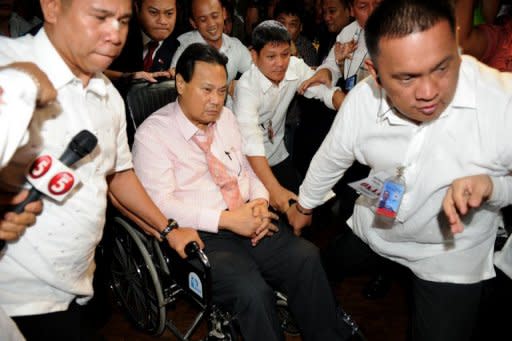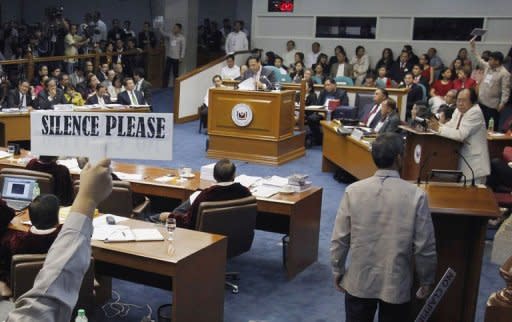Philippines' top judge testifies, walks out of trial
The Philippines' top judge denied he was a crook as he testified then dramatically walked out at his own trial Tuesday, denouncing his impeachment as a personal vendetta by President Benigno Aquino. Aquino, who won a landslide election victory in 2010 on a platform to end corruption, has said driving Supreme Court chief justice Renato Corona from office would be a crucial step in ridding the country of pervasive corruption. Corona was accused of failing to declare up to $12 million in bank accounts and blocking Aquino's efforts to prosecute former president Gloria Arroyo for corruption. "I did not steal a single centavo from the government," Corona said during a three-hour testimony at his trial in the Senate, in which the 63-year-old repeatedly broke down. "I did not violate any law," he said, and later stunned the court by standing up and leaving. His lawyers later said Corona, a diabetic, felt unwell but assured Senate president Juan Ponce Enrile that he would return to the stand on Wednesday "We will give him until tomorrow to return. If he will not return for cross-examination, then we'll consider this case submitted for resolution," warned Enrile. The bulk of Corona's testimony Tuesday sought to discredit Aquino as well as Ombudsman Conchita Morales, who had disclosed documents on the chief justice's alleged 82 bank accounts that prosecutors described as a "smoking gun". Corona said he had been investing his salary since the start of his career in 1968, but that he has just four dollar and four peso bank accounts. They held "much less" than $12 million, he said without elaborating. He accused the prosecutors of fabricating evidence and said he was not under any obligation to disclose the bank deposits in his annual statement of assets and liabilities. The country's foreign currency deposits law guaranteed their secrecy, he said, adding his peso accounts were "commingled funds" including money owned by relatives. He also offered to authorise his bankers to submit all his bank accounts to public scrutiny, but only if all the legislators who had impeached him would also sign a similar waiver. Corona was impeached by the House of Representatives, parliament's lower chamber, in December, sending him for trial in the Senate. Corona is the last witness in a trial that began in mid-January. The proceedings have gripped the nation for four months, with millions watching the drama live on TV. Prosecutors allege Corona lacked integrity, failed to declare his assets properly, and blocked Arroyo's prosecution. They said his actions amounted to "culpable violation" of the constitution and betrayal of public trust. A guilty verdict on any of the three charges would lead to his removal from office. There is no appeal process and the government would then be able to pursue criminal charges against him over the alleged hidden wealth. Aquino's allies have said Arroyo planted Corona in the Supreme Court just before leaving office in 2010 as a rearguard action to protect herself from future criminal prosecutions. After ruling for nearly 10 years, Arroyo was arrested last year and charged with vote-rigging. Corona alleged Tuesday that his impeachment was a personal vendetta by "the landlord president" following a landmark Supreme Court verdict that would break up Hacienda Luisita, a giant sugar estate owned by the president's clan. The Supreme Court ruled last year that 4,300 hectares (10,600 acres), or most of the estate, must be subjected to land reform and sold in small parcels to its workers. The court threw out the clan's appeal last month, leaving the government no choice but to enforce the ruling.



